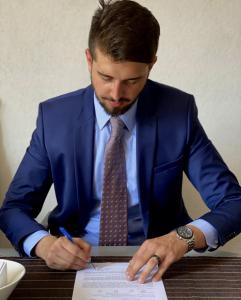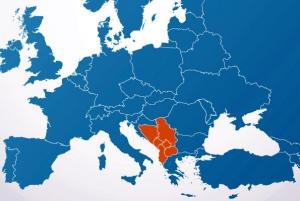Adin Ramdedovic's Vision for Renewable Energy: Europe's Success Stories and the Future for the Western Balkans
Adin Ramdedovic's vision for renewable energy in the Western Balkans: Lessons from Europe & the US.
FRIEDRICHSHAFEN, BADEN-WURTTEMBERG, GERMANY, April 18, 2023/EINPresswire.com/ -- As the world continues to grapple with the adverse effects of climate change, the push for renewable energy has become more critical than ever. In 2020, renewable energy accounted for 38% of electricity produced in the European Union, with wind and solar power making significant contributions to this figure. Countries like Germany and Denmark have been leading the charge, demonstrating the vast potential for renewable energy development. Meanwhile, the United States has made significant strides in embracing solar and wind energy, with renewable energy capacity expected to reach 30% by the end of 2023.In this article, we will explore the renewable energy landscape in Europe and the United States, drawing on lessons learned from these successful cases. With financial consultant and analyst Adin Ramdedovic's expert insights, we will discuss the untapped potential for renewable energy development in the Western Balkans, focusing on countries like Bosnia and Herzegovina, Montenegro, and Serbia. We will examine how foreign direct investment and partnerships with foreign companies can help these countries adopt greener, more sustainable energy solutions.
Europe's Renewable Energy Success Stories:
Germany has long been a pioneer in renewable energy, with a current target of generating 65% of its electricity from renewable sources by 2030. The country's Energiewende (Energy Transition) policy has led to impressive growth in wind and solar power capacity. In 2021, Germany broke the record for the most solar power capacity installed in a single year, with over 6 GW added to its grid. Adin Ramdedovic highlights the importance of Germany's Feed-in Tariff system, which has encouraged investment in renewable energy projects by guaranteeing producers a fixed price for the electricity they generate.
Denmark, another European renewable energy frontrunner, has set an ambitious goal of becoming carbon neutral by 2050. The country's success in this endeavor is driven by its robust wind energy sector, which currently supplies nearly 50% of its electricity. Ramdedovic notes that Denmark's emphasis on public-private partnerships and a stable regulatory environment has attracted significant investments, resulting in one of the highest wind energy capacities per capita globally.
The United States' Renewable Energy Progress:
In recent years, the United States has made substantial progress in renewable energy, with solar and wind energy capacity more than doubling between 2014 and 2021. According to Adin Ramdedovic, the U.S. experience illustrates the power of market-driven incentives and supportive government policies in promoting renewable energy growth. The federal Investment Tax Credit (ITC) has been a key driver, providing a 30% tax credit for solar projects and stimulating investment in the sector. Additionally, state-level Renewable Portfolio Standards (RPS) have mandated utilities to increase their renewable energy generation, creating a competitive market for renewable energy developers.
The Potential for Renewable Energy in the Western Balkans:
Despite the wealth of renewable energy resources in the Western Balkans, countries like Bosnia and Herzegovina, Montenegro, and Serbia have yet to fully capitalize on this potential. Ramdedovic suggests that adopting successful strategies from European and American examples could dramatically increase the region's renewable energy capacity.
Foreign direct investment can play a crucial role in developing the Western Balkans' renewable energy sector. Ramdedovic emphasizes the need for stable, transparent regulatory environments to attract investment from European and American companies. By working together with foreign firms, local governments can access the necessary expertise and technology to implement renewable energy projects, creating job opportunities and stimulating economic growth.
Moreover, Ramdedovic points out that public-private partnerships can facilitate the financing and implementation of renewable energy projects in the Western Balkans. By collaborating with private companies, governments can share the risks and benefits of renewable energy investments, while leveraging the expertise and resources of the private sector. Such partnerships have proven effective in Denmark and can serve as a model for the Western Balkans.
Ramdedovic also suggests that the Western Balkans can benefit from adopting incentive mechanisms similar to Germany's Feed-in Tariff system and the United States' Investment Tax Credit. These policies have been instrumental in driving renewable energy growth in their respective countries and could help stimulate investment in the Western Balkans.
As the world moves toward more sustainable energy solutions, the Western Balkans have the opportunity to harness their untapped renewable energy potential. By learning from the successful cases of Germany, Denmark, and the United States, countries like Bosnia and Herzegovina, Montenegro, and Serbia can develop their renewable energy sectors through foreign direct investment, public-private partnerships, and supportive government policies.
Adin Ramdedovic's insights underscore the importance of a stable regulatory environment, market-driven incentives, and international collaboration in advancing renewable energy development. By embracing these strategies, the Western Balkans can not only contribute to global efforts to combat climate change but also create new economic opportunities and improve the quality of life for their citizens.
Adin Ramdedovic
Adin Ramdedovic
adin.ramdedovicc@gmail.com
Visit us on social media:
Facebook
Instagram
Legal Disclaimer:
EIN Presswire provides this news content "as is" without warranty of any kind. We do not accept any responsibility or liability for the accuracy, content, images, videos, licenses, completeness, legality, or reliability of the information contained in this article. If you have any complaints or copyright issues related to this article, kindly contact the author above.


